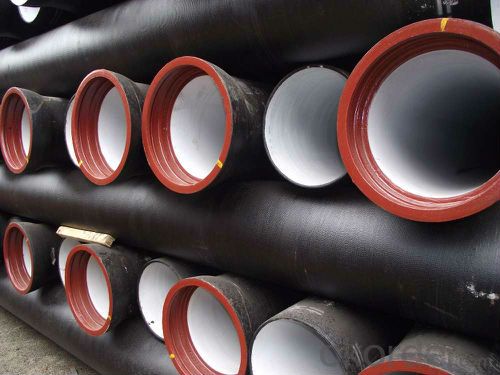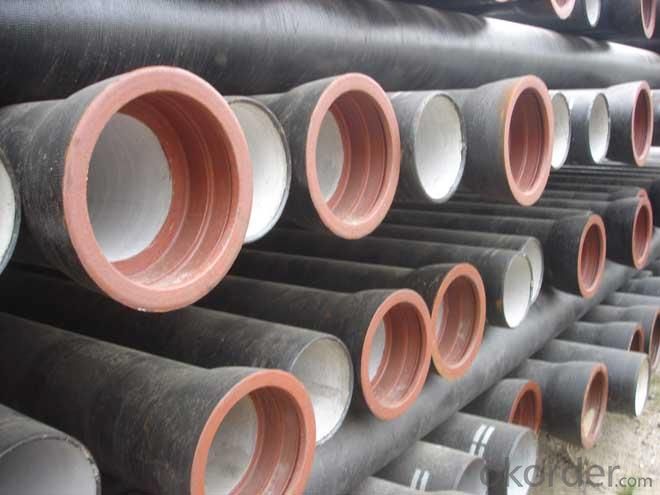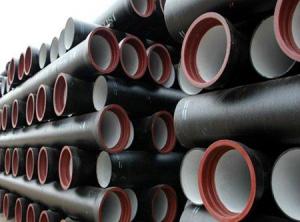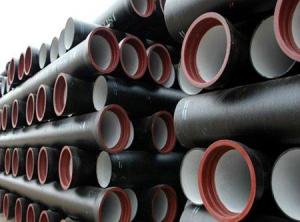Ductile Iron Pipe ISO2531and EN545 Standards
- Loading Port:
- China main port
- Payment Terms:
- TT or LC
- Min Order Qty:
- 1000 m
- Supply Capability:
- 300000 m/month
OKorder Service Pledge
OKorder Financial Service
You Might Also Like
1. Ductile Iron Pipe Description :
1 |
Type:
| The T-type Joint Pipe (Push-on) |
The K-type Joint Pipe | ||
The Self-Restrained Joint Pipes | ||
2 | Standard: | ISO2531, EN545, EN598, etc |
3 | Size: | DN80~2600mm |
4 | Material: | Ductile Cast Iron GGG50 |
5 | Pressure: | PN10, PN16, PN25,PN40 |
6 | Class: | K9, K8, C25, C30, C40 |
7 | Length: | 6m, cut to 5.7m |
8 | Application: | Water supply project, drainage, sewage, irrigation, water pipeline. |
9 | Certificate: | ISO9001, BV, WRAS, SGS |
10
| Internal Coating: | a). Portland cement mortar lining |
b). Sulphate Resistant cement mortar lining | ||
c). High-Aluminum cement mortar lining | ||
d). Fusion bonded epoxy coating | ||
e). Liquid epoxy painting | ||
f). Black bitumen painting | ||
11 | External Coating: | a). zinc+bitumen(70microns) painting |
b). Fusion bonded epoxy coating | ||
c). Zinc-aluminum alloy +liquid epoxy painting | ||
12 | Packing: | Bundles, in bulk |
Note: The coating can also be accordance with customers' requirements. | ||
2. Ductile Iron Pipe Main Features:
- For potable water supply
- High strength
- Long lifespan
- Good corrosion resistance
- Easy installation
3.Ductile Iron Pipe Images:


4.Ductile Iron Pipe Specification:
1.Standard:ISO2531,EN545,EN598
2.Effective Length:6m/5.7m
3.Internal Lining :Cement mortar, Cement mortar Plus Epoxy
4.External coating:Zinc Primer Plus Bitumen or PE
5. Shipment: By bulk ship or 20'/40' container
6. Rubber: NBR, SBR, EPDM according to ISO4633/EN681.1
7.Quick Delivery
5.FAQ:
Here some questions always been asked
1.For Price CIF CFR FOB CPT and so on both ok for us
2.For Delivery we must try us best to send goods to you asap
3.For Package all standard seaworthy package
4.For Payment, T/T L/C which convenience for you will be ok
- Q:What is the average cost of ductile iron pipes?
- The average cost of ductile iron pipes can vary depending on various factors such as diameter, length, and location. On average, ductile iron pipes can range from $30 to $100 per linear foot. For example, a 6-inch diameter ductile iron pipe with a length of 20 feet may cost around $600 to $2,000. It's important to note that these prices are estimates and can change based on market conditions, project specifications, and supplier pricing. Therefore, it is recommended to consult with local suppliers or contractors to obtain accurate pricing information for specific projects.
- Q:What is the expected corrosion rate of ductile iron pipes?
- Several factors can influence the expected corrosion rate of ductile iron pipes, including the specific environment in which they are installed, the pH and composition of the water or soil they come into contact with, and the presence of any corrosive substances or chemicals. Compared to materials like cast iron or steel, ductile iron pipes are well-known for their excellent resistance to corrosion. This is because they naturally develop a protective layer called a passive film on their surface when exposed to oxygen in the environment. This passive film acts as a barrier, preventing further corrosion. However, it is important to acknowledge that even ductile iron pipes can experience some degree of corrosion over time, especially in aggressive or highly corrosive environments. The expected corrosion rate can vary from very low to moderate, depending on the aforementioned factors. To ensure the durability and performance of ductile iron pipes, it is advisable to follow proper maintenance and monitoring practices. This includes regular inspections, cleaning, and the application of protective coatings or linings when necessary. Furthermore, implementing a cathodic protection system can further enhance the pipes' corrosion resistance. Ultimately, consulting experts and professionals in the field of corrosion and pipe materials is crucial for accurately determining the expected corrosion rate of ductile iron pipes in a specific application or environment.
- Q:What are the advantages of using ductile iron pipes over other materials?
- Using ductile iron pipes instead of other materials offers several advantages. To begin with, ductile iron pipes have a higher level of strength and durability compared to materials like PVC, HDPE, or concrete pipes. They possess a high tensile strength, enabling them to withstand greater pressure and handle heavy loads without cracking or breaking. This makes them suitable for a range of applications, including water and sewage systems, as well as industrial pipelines. Additionally, ductile iron pipes exhibit excellent resistance to corrosion. They typically feature a protective coating, such as zinc or epoxy, which prevents the formation of rust and extends their lifespan. This makes them ideal for underground installations or areas with aggressive soil conditions or corrosive substances. Furthermore, ductile iron pipes offer flexibility. They can be manufactured in various lengths, diameters, and angles, allowing for easy installation and adaptation to different project requirements. Moreover, their flexibility enables them to withstand ground movements, such as settlement or seismic activities, without causing significant damage. Moreover, ductile iron pipes have a smooth internal surface, which reduces friction and enhances flow efficiency. This results in reduced energy consumption for pumping systems and lower maintenance costs. Additionally, the smooth surface minimizes the risk of deposits or clogs, ensuring a consistent and uninterrupted flow of fluids. Lastly, ductile iron pipes boast a long service life. With proper installation and maintenance, they can last for over 100 years. This longevity not only reduces the need for frequent replacements but also provides a sustainable and cost-effective solution for infrastructure projects. In conclusion, the utilization of ductile iron pipes offers numerous advantages over other materials. These include superior strength, corrosion resistance, flexibility, a smooth internal surface, and a long service life. These qualities make them a reliable choice for various applications, providing efficient and durable solutions for water, sewage, and industrial pipelines.
- Q:What is the cost of ductile iron pipes compared to other pipe materials?
- The price of ductile iron pipes can vary depending on a variety of factors, including size, length, and supplier. However, when compared to materials like PVC or steel, ductile iron pipes generally tend to be more expensive. This is primarily due to the manufacturing process and the inherent qualities of ductile iron that make it a durable and dependable choice for various applications. Ductile iron pipes are renowned for their high tensile strength, resistance to corrosion, and durability. These qualities make them suitable for transporting potable water, wastewater, and other fluids under high pressure. The production process for ductile iron involves the addition of magnesium to cast iron, resulting in improved strength and flexibility. This additional step, combined with the quality of the material, contributes to the higher cost. On the other hand, pipes made from materials such as PVC or steel can be less costly. PVC pipes are lightweight, easy to install, and relatively inexpensive, making them a popular choice for low-pressure applications like irrigation or drainage systems. Steel pipes, known for their strength and durability, are often used in high-pressure situations but come with a higher price tag than PVC. In the end, while ductile iron pipes may have a higher initial cost, their longer lifespan and reliability can make up for the investment over time. Other factors, such as project requirements, local regulations, and material availability, can also impact the overall cost comparison between ductile iron pipes and other pipe materials.
- Q:Are ductile iron pipes suitable for use in paper mills?
- Yes, ductile iron pipes are suitable for use in paper mills. Ductile iron is known for its high strength and durability, making it an excellent choice for various industrial applications, including paper mills. These pipes can withstand high-pressure systems and are resistant to corrosion, making them suitable for transporting water, chemicals, and other fluids commonly used in paper mills. Additionally, ductile iron pipes have good impact resistance, which is beneficial in an environment where heavy machinery and equipment are often present. Overall, ductile iron pipes are a reliable and long-lasting option for paper mills due to their strength, durability, corrosion resistance, and ability to handle high-pressure systems.
- Q:How are ductile iron pipes protected against abrasion or wear?
- Various methods and protective coatings are utilized to protect ductile iron pipes against abrasion or wear. One commonly employed method involves the application of cement mortar lining on the inner surface of the pipe. This creates a smooth and durable layer that effectively resists the damaging effects of flowing water and other substances passing through the pipe. Furthermore, external protection for ductile iron pipes can be achieved by applying a bituminous or epoxy coating. These coatings act as a barrier, safeguarding against external factors like soil or chemicals that may lead to wear or corrosion. By serving as a protective layer, they prevent direct contact between the iron pipe and the surrounding environment. Moreover, in areas where severe abrasion or wear conditions are prevalent, special linings or coatings can be applied. Polyethylene encasement or polyurethane lining can be utilized to provide enhanced protection against abrasion, especially in regions where the pipe is exposed to high turbulence or abrasive materials. In certain cases, ductile iron pipes can also be reinforced with additional materials such as fiberglass or steel wire to increase their resistance to abrasion or wear. These reinforcements offer an extra layer of protection, strengthening the pipe and reducing the likelihood of damage. Overall, ductile iron pipes are designed with a combination of protective measures to ensure their durability and resistance to abrasion or wear. These measures encompass cement mortar linings, protective coatings, special linings or coatings for severe conditions, and reinforcements. These protective methods play a crucial role in prolonging the lifespan of the pipes and maintaining their functionality even in challenging environments.
- Q:Can ductile iron pipes be used for wastewater pumping stations?
- Yes, ductile iron pipes can be used for wastewater pumping stations. Ductile iron pipes have excellent strength and durability, making them suitable for transporting wastewater and handling the high pressures and corrosive nature of the sewage. Additionally, ductile iron pipes have a smooth interior surface, which prevents clogs and allows for efficient flow of wastewater. These pipes are also resistant to damage from external factors such as soil movement or heavy traffic, making them a reliable choice for wastewater pumping stations.
- Q:How does ductile iron pipe handle soil movements and settlements?
- Ductile iron pipe has gained a reputation for effectively managing soil movements and settlements. Its ability to accommodate ground shifts and settling without compromising its structural integrity is attributed to its flexibility and durability. A notable characteristic of ductile iron pipe lies in its inherent strength and resilience. It can endure external pressures and stress caused by soil movements, including lateral forces and ground settlement. This is due to its high tensile strength, which enables it to resist deformation and maintain its shape even under substantial loads. Furthermore, the flexibility of ductile iron pipe plays a crucial role in its capacity to handle soil movements. The pipe's natural flexibility allows it to absorb the impacts of ground shifts and movements without fracturing or breaking. It can bend and adjust to changes in the surrounding soil, minimizing the risk of pipe failure or leakage. Additionally, the joint design of ductile iron pipe contributes to its effectiveness in managing soil movements and settlements. The installation employs a push-on joint system that permits some movement and settlement without compromising the overall integrity of the pipeline. The joints can absorb and distribute stress and movement, minimizing the risk of pipe failure. In conclusion, ductile iron pipe excels in managing soil movements and settlements. Its strength, flexibility, and joint design enable it to withstand external pressures resulting from ground shifts, settling, and other soil movements. As a result, ductile iron pipe is a reliable choice for a range of applications where soil movement is a concern.
- Q:How do ductile iron pipes perform in high-temperature water applications?
- Ductile iron pipes possess remarkable strength, durability, and exceptional mechanical properties, rendering them suitable for diverse applications. However, certain factors must be taken into consideration when utilizing them in high-temperature water scenarios. Typically, ductile iron pipes exhibit satisfactory performance in high-temperature water settings up to a specific threshold. The exact temperature constraint hinges on the particular grade of ductile iron employed and the duration of exposure to elevated temperatures. Generally, ductile iron pipes can endure temperatures ranging from 350 to 400 degrees Fahrenheit for brief periods without suffering significant deterioration or loss of strength. Nevertheless, it is crucial to acknowledge that prolonged exposure to high temperatures can have adverse effects on ductile iron pipes. When subjected to elevated temperatures, these pipes may undergo thermal degradation, which can result in diminished mechanical properties, heightened brittleness, and even eventual cracking or failure. To mitigate the risks associated with high-temperature water applications, several precautionary measures can be implemented. Firstly, selecting a suitable grade of ductile iron with an elevated temperature tolerance can enhance the pipes' performance. Secondly, incorporating adequate insulation or heat shielding measures can minimize direct heat transfer to the pipes, thereby reducing the likelihood of thermal degradation. Furthermore, frequent monitoring and maintenance of ductile iron pipes utilized in high-temperature water settings are crucial to promptly identify any indications of degradation or damage and take appropriate remedial actions to prevent failure. In conclusion, although ductile iron pipes typically perform well in high-temperature water applications, it is imperative to thoroughly evaluate the specific conditions and requirements of the application to ensure their sustained performance and integrity.
- Q:What are the different pressure ratings available for ductile iron pipe?
- Ductile iron pipe, known for its strength, durability, and resistance to corrosion, finds widespread use in various applications. The pressure ratings of this type of pipe depend on factors like diameter and wall thickness. Typically, ductile iron pipe offers pressure ratings ranging from 150 psi to 350 psi. For pipes with smaller diameters, usually measuring between 3 inches and 24 inches, commonly available pressure ratings include 150 psi, 200 psi, and 250 psi. These ratings suit a broad range of applications, including water distribution systems, sewer lines, and industrial piping. For larger diameter pipes, typically ranging from 30 inches to 64 inches, the usual pressure ratings are 150 psi, 200 psi, 250 psi, and 350 psi. These higher ratings are necessary for transporting larger volumes of water or other fluids across longer distances. It is worth noting that the pressure ratings of ductile iron pipe adhere to industry standards and guidelines. These standards ensure that the pipe can safely withstand both internal pressure and external loads during operation. When choosing the appropriate pressure rating for ductile iron pipe, it is vital to consider factors such as the specific application, flow rates, and expected operating conditions. Seeking advice from industry experts and adhering to local codes and regulations is crucial to ensure the correct selection and installation of ductile iron pipe for a particular project.
1. Manufacturer Overview |
|
|---|---|
| Location | |
| Year Established | |
| Annual Output Value | |
| Main Markets | |
| Company Certifications | |
2. Manufacturer Certificates |
|
|---|---|
| a) Certification Name | |
| Range | |
| Reference | |
| Validity Period | |
3. Manufacturer Capability |
|
|---|---|
| a)Trade Capacity | |
| Nearest Port | |
| Export Percentage | |
| No.of Employees in Trade Department | |
| Language Spoken: | |
| b)Factory Information | |
| Factory Size: | |
| No. of Production Lines | |
| Contract Manufacturing | |
| Product Price Range | |
Send your message to us
Ductile Iron Pipe ISO2531and EN545 Standards
- Loading Port:
- China main port
- Payment Terms:
- TT or LC
- Min Order Qty:
- 1000 m
- Supply Capability:
- 300000 m/month
OKorder Service Pledge
OKorder Financial Service
Similar products
New products
Hot products
Related keywords




























